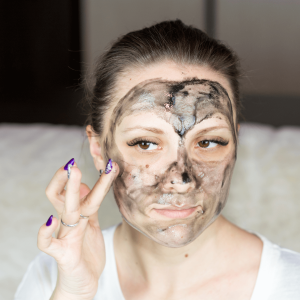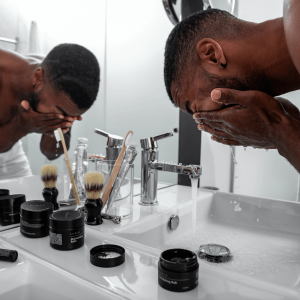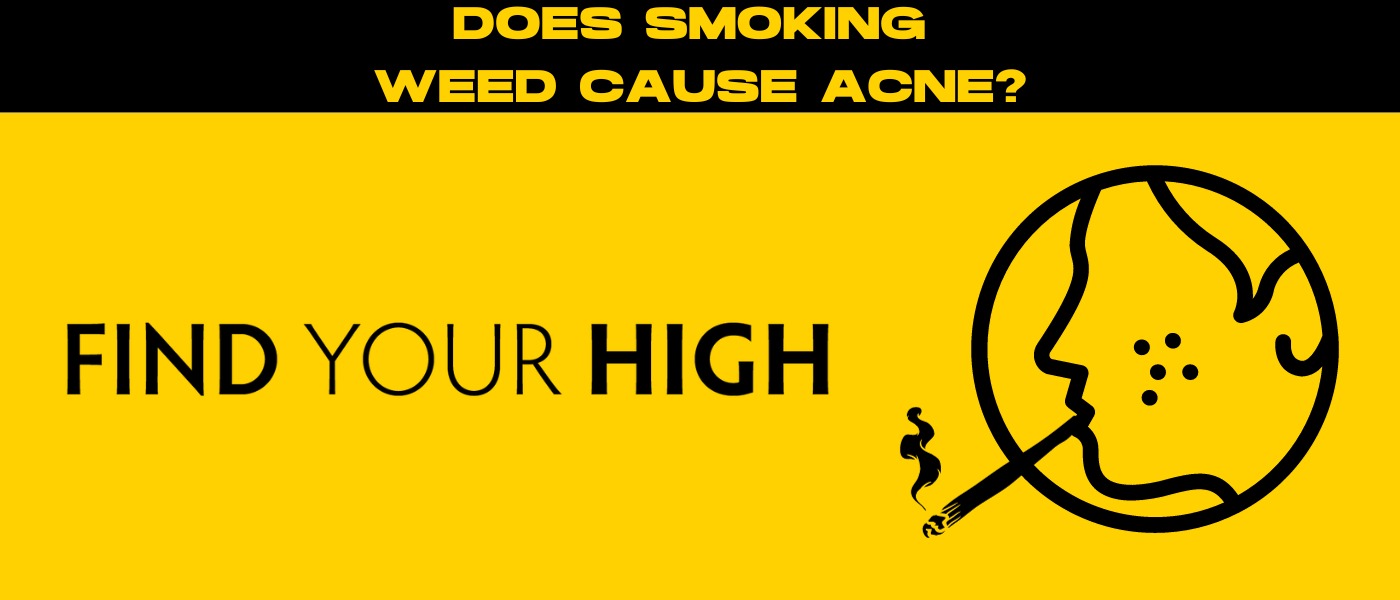In a person’s never-ending journey toward skin health and wellness, skin irritation and acne often stand as unwelcome hurdles. If you’re one of the many unlucky stoners dealing with severe acne, you may find yourself asking does smoking weed cause acne?
This common skin condition, characterized by clogged pores and inflamed sebaceous glands, can be instigated by factors ranging from hormonal changes to diet. And interestingly enough, recent research suggests a potential connection between skin health and a rather unconventional source – cannabis.
In this blog, we’ll dive into the relationship between smoking weed and acne, shedding light on the possible implications of cannabis use for acne treatment and overall skin health. Stay tuned!
Understanding Cannabis and Acne
Cannabis has been in the limelight for a while now, capturing the attention of both the beauty and medical industries for its potential health benefits. But how could it affect skin problems and acne?
Components of Cannabis
In order to understand the impact of cannabis on acne, it’s essential to understand the key components within the plant:
- THC (Tetrahydrocannabinol): This is the psychoactive compound in cannabis that gives marijuana users a feeling of euphoria or a “high.”
- CBD (Cannabidiol): Unlike THC, CBD is non-psychoactive and is widely recognized for its potential therapeutic benefits, including anti-inflammatory properties.
- Other Cannabinoids: Although CBD and THC are the most well-known, cannabis contains over 100 other cannabinoids, like CBN or CBG, many of which have their own unique properties and effects.
Potential Effects on Hormones
Research suggests that cannabis, specifically the cannabinoid CBD, may be able to help regulate sebum production in the skin.
Sebum is an oily, waxy substance that can build up in pores and lead to acne. By regulating this, cannabis could potentially help to treat acne flare-ups and actually control existing acne breakouts.
Impact of Smoking vs. Other Consumption Methods
Smoking cannabis, like smoking anything else, can have negative impacts on your skin, potentially making acne worse or triggering existing acne conditions.
However, alternative methods, such as oral consumption or topical application, avoid these issues and could provide the potential skin benefits of cannabis without the negatives associated with smoking.

Conflicting Research
There are loads of studies out there with different opinions on the connection between cannabis and acne.
Some say there’s a direct link between marijuana use itself, suggesting that certain components in cannabis, like THC, could make your skin produce more oil and lead to acne. But then there are other studies that disagree, saying things like diet, stress, and genetics actually have a bigger impact on acne than cannabis use.
So, does smoking weed cause acne? Well, it depends. Ultimately, it’s important to remember that everyone is different, so how your skin reacts to cannabis might not be the same as someone else. While cannabis might make acne worse for some people, it might not affect others at all.
The Role of Cannabinoid Receptors
Cannabinoid receptors play a super important role in keeping our bodies functioning and feeling good.
They have a close relationship with the endocannabinoid system, which is a complex network that helps maintain balance in our bodies. This connection is key for things like controlling our mood, feeling pain, managing appetite, and remembering important details.
Additionally, there’s some new research suggesting that cannabinoid receptors might have an impact on acne production and our skin’s oil production, otherwise known as sebum. Cannabinoids have anti-inflammatory properties that may help reduce sebum production and improve acne symptoms.
However, it’s important to use cannabis responsibly and consult a healthcare professional before making any changes to your skincare routine.
Lifestyle Factors
Aside from adding or omitting cannabis from your daily routine, there are many different lifestyle factors that impact overall health and well-being. For example…
Impact of Smoking on General Health
Smoking weed can have some health implications, although it’s not necessarily as harmful as smoking cigarettes. It may still impact general health by potentially increasing the risk of certain conditions such as heart disease, stroke, and lung issues. Additionally, it can affect the immune and nervous system, and marijuana smoke may have negative effects on the skin, teeth, and hair, which could impact overall appearance.
Nutrition and Hydration
Nutrition and hydration play critical roles in maintaining good health. A diet rich in fruits, vegetables, lean proteins, and grains provides the necessary nutrients for body function and growth. Hydration is also essential, as water helps in digestion, absorption, circulation, creation of saliva, transportation of nutrients, and maintenance of body temperature.
Skincare Routine and Hygiene Practices
A good skincare routine and proper personal hygiene practices are vital for maintaining healthy skin and preventing acne, wrinkles, and other skin issues. This involves cleansing, toning, and moisturizing the skin and using sunscreen to protect from harmful UV rays. Regularly washing hands, brushing and flossing teeth, and maintaining personal cleanliness also significantly contribute to overall health.

Other Factors Influencing Acne
While we often associate acne primarily with factors such as poor hygiene or unhealthy food habits, there are numerous other lesser-known yet influential factors in acne development.
Genetics and family history, for instance, play a significant role in determining our skin’s predisposition towards acne. In other words, if your parents or close relatives had acne, you are more likely to experience it as well.
Hormonal levels, particularly during puberty, pregnancy, or menstrual cycles, can trigger acne and also lead to increased oil production, resulting in acne.
Lastly, our emotional and physical environment affects acne development and our skin’s health. High stress levels can worsen acne or existing acne symptoms, while exposure to pollution and certain environments can clog pores, causing or exacerbating acne issues.
Understanding these factors can provide a more holistic approach to acne prevention and treatment for young adults.
Tips for Maintaining Skin Health
Maintaining healthy skin goes beyond just external treatments and lotions. It includes holistic practices that account for our internal health, lifestyle choices, and daily hygiene practices.
Hygiene Practices
Good hygiene is the cornerstone of skin health. Regular cleansing with gentle, non-comedogenic products can prevent the build-up of dirt and oils, reducing the risk of acne and other skin conditions. It’s also important to remember not to touch your face unnecessarily, as our hands often carry bacteria that can lead to more acne breakouts too.

Balanced Diet and Nutrition
The food we consume directly impacts our skin health. A balanced diet rich in fruits, vegetables, lean proteins, and healthy fats can provide the essential nutrients required for maintaining skin health. Vitamins like A, C, and E, along with minerals like zinc and selenium, play a crucial role in skin repair, protection, and overall health.
Monitoring Cannabis Consumption and Effects
While cannabis has been lauded for its potential skin benefits, particularly in terms of reducing inflammation and pain, it’s critical to monitor its consumption and effects. Consuming marijuana can dry out the skin and lead to premature aging and skin irritation, especially when smoking weed. It’s best to consult a healthcare professional to understand the right dosage and consumption method for your specific requirements.
Conclusion
So, here’s the deal with acne: it’s a complex thing influenced by a bunch of factors like hormones, genetics, diet, stress, and skincare. Does smoking weed cause acne? Not necessarily because it’s not just one thing that causes acne, but a mix of many factors all playing a part. That’s why it’s important to have a personalized approach to treatment and prevention.
Understanding the complexity of acne and considering all these different factors is key to making informed choices for your skin and overall well-being.

Frequently Asked Questions
1. Does smoking cause acne?
The relationship between smoking weed and acne is still under scientific research. While no definitive studies have proven that recreational marijuana use directly causes acne, some research suggests that marijuana smoke could influence factors related to acne.
For instance, marijuana may have an impact on hormones, which in turn, could potentially make inflammatory skin diseases, such as an outbreak of acne, worse. Additionally, smoking weed in general can affect the health of your skin. However, more research is needed in this area to establish a direct link.
2. Does weed cause hormonal imbalance?
Yes, research suggests that cannabis can cause hormonal imbalances. The active component of cannabis, THC, interacts with the endocannabinoid system in the body, which plays a crucial role in regulating a variety of physiological processes, including hormone secretion.
But does smoking weed cause acne? Not necessarily; however, chronic use of cannabis can disrupt different physiological processes, leading to changes in hormone levels including cortisol, prolactin, and even testosterone levels. It’s important to note that individual responses to marijuana use can vary widely, and more research is needed to fully understand the extent and mechanisms of these effects.
3. Does weed stunt your growth?
The impact of smoking marijuana on physical growth is still being researched. Some studies indicate potential negative effects on physical development, especially if starts in adolescence. However, definitive conclusions are yet to be reached due to the complexities of human growth and the numerous variables involved. It’s important to note that using any substance during crucial developmental stages can pose health risks. Consulting a healthcare professional is always advisable for accurate information.

 Rewards
Rewards





